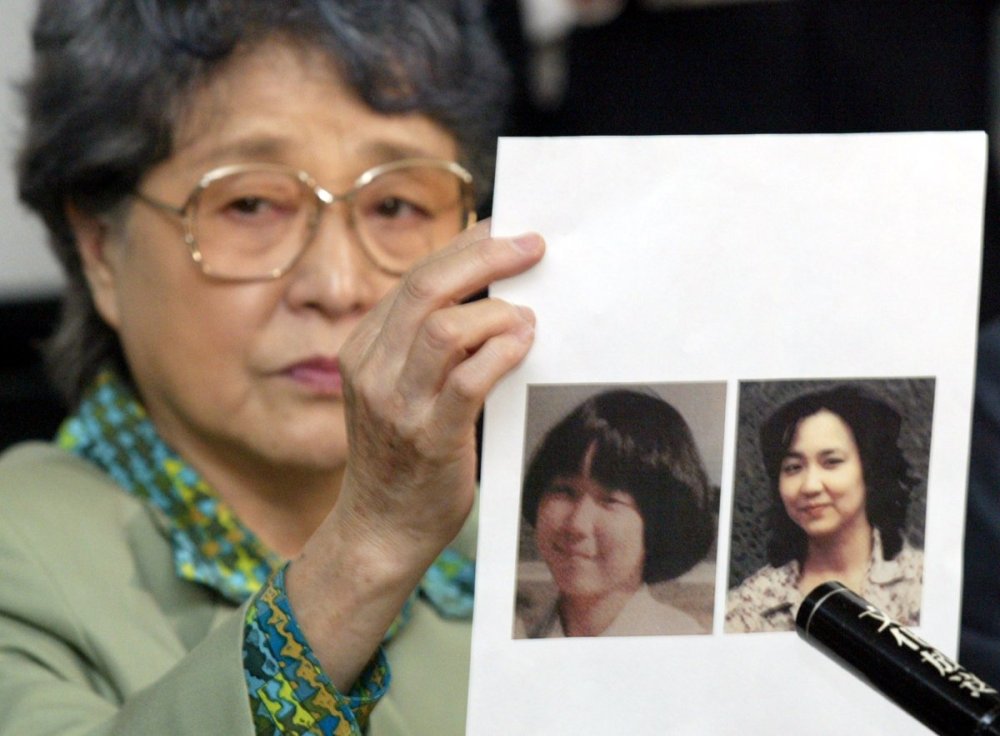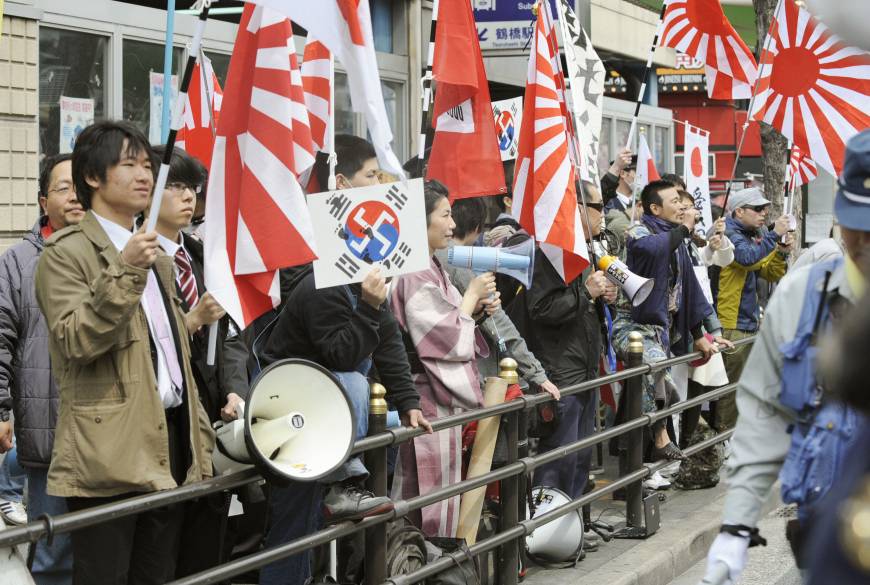Among many issues that the United Nations Commission of Inquiry (UN COI) on the human rights situations in the Democratic People’s Republic of Korea (DPRK) covered in their 2014 report was the kidnapping of foreign nationals by North Korean spies under the direct order by Kim Jong Il, the father of the current leader Kim Jong Un and the son of the first leader Kim Il Sung.

[Photo: Sakie Yokota holds up a photo of her daughter Megumi Yokota, who was kidnapped by North Korean agents in 1977 at the age of 13]
The 2014 COI report found that since 1950, the DPRK government has systematically kidnapped nationals from South Korea, Japan, China, Thailand, Europe, and the Middle East. Pyongyang forced them to stay in North Korea where the commission found that gross human rights violations had taken place – including public executions, enslavement, torture, rape, forced abortions, and other sexual violence.
After the release of the UN COI report, North Korea agreed in May 2014 to launch a new probe into the abductions. In exchange Japan agreed to ease some unilateral sanctions on North Korea, though it continues to enforce sanctions backed by the UN over North Korea’s nuclear and long-range missile programs. The Japanese delegation, led by Junichi Ihara, head of the Asia and Oceania affairs bureau at Japan’s ministry of foreign affairs, met with his North Korean counterpart, Song Il Ho in October 2014 as progress in the DPRK investigation had been very slow.
Marzuki Darusman, the UN Special Rapporteur on human rights in North Korea, repeats the same claim made by the Japanese in his 2015 report, urging “sustained and resolute action” by the international community to shed light on “all cases of abductions” and returning those still alive to their countries of origin. He urged the United Nations Security Council and General Assembly to take up the issue and recommending the convening of an international conference to address forced disappearances by the North Korean authority.
Along with Darusman, Japan launched another major push at the UN in May 2015 to rally support for this international move to raise the North Korean abduction issues. Japan’s Minister on the Abduction Issue, Eriko Yamatani, said she is seeking “specific actions” from countries to turn up the pressure on North Korea and to seek information on the fate of the abductees. Yamatini, however, is accused of having links with the far-right group Zaitokukai that has been advocating for Japan to expel its Korean population, calling them “cockroaches” and screaming slogans like “kill kill Koreans” publicly.

[Photo: Members of the anti-Korean Zaitokukai rightist group demonstrate in March outside Tsuruhashi Station in Osaka]
The UN, with a big push from Japan, tries to internationalise the North Korean human rights issues by focusing on the abduction issues. Previously, the agendas pretty much focused on domestic issues such as political prisons, torture and public executions. After Shin Dong Hyuk’s confession that parts of his stories are not accurate, the focus on political prisons has been shifted to kidnapping of foreigners and forced labour of North Korean migrants overseas.
Among those allegedly kidnapped are, according to the UN COI report, from Romania, Lebanon, Malaysia, Singapore and Thailand, and possibly other countries. A Japanese NGO, called the National Association for the Rescue of Japanese Kidnapped by North Korea, claims that in August 1978 in Singapore, two Japanese men requested an escort company to send five ladies for a floating party, after which the whole boat disappeared to North Korea. They were four Malaysians, aged between 19 and 22 (Yeng Yoke Fun, Yap Mee Leng, Seetoh Tai Thim, Margaret Ong Guat Choo) and 24-year-old Singaporean woman, called Diana Ng Kum Yim.

This “multitrack strategy” Darusman laid out in his report is not going to work when collaborating with Malaysia or Singapore, mainly due to the friendly relations these two countries have with the DPRK. Malaysia and Singapore have established formal diplomatic relations with the DPRK in 1973 and 1975, respectively. Malaysia has the DPRK Embassy since 2003 and, for Malaysians, North Korea is a visa-free country.
Similarly, Singapore hosts the DPRK Embassy and has a visa-free agreement with Pyongyang. Singapore also has deep business and trade interests in North Korea and is indeed the 10th largest trading partner of the isolated country. Pyongyang’s first fast food restaurant was opened by Singaporeans. Singaporean Chinpo Shipping Company channelled the funds to pay for the shipment of weapons bound to North Korea from Cuba. Choson Exchange, founded by Geoffrey See, offers business workshops for North Koreans in North Korea, Singapore, Vietnam and Malaysia. See has brought tens of North Korean officials to Singapore and taught them Singapore-style development on public housing, transport and direct investment.
Neither Malaysia nor Singapore is likely to stand up and pressure North Korea they have friendly relations with. Malaysia and Singapore themselves don’t have good human rights records, either. Both countries frequently detain opposition leaders (Singapore used to, but doesn’t any more), control the media and repress public protests.
More importantly, no families of the alleged victims have stood up and claimed their right to family reunion. Although their daughters and sisters disappeared for almost 40 years, the Malaysian families refused to show up in press conferences. There isn’t any activism on forced disappearances of these five young women who suddenly disappeared since 1978. Many suspect it’s because of their profession in escort services who were perceived as no worth advocating for their human rights.
Whether Jenkins is a credible source is another anecdote to add to the question of validity of witness accounts for the UN COI, the point which I made in the previous article at NK News and The Guardian.
The information about kidnapping four Malaysians and one Singaporean escort ladies is from Charles Jenkins, a US soldier who deserted his unit to cross the Korean demilitarized zone in 1965 and lived there until 2004 to join his Japanese wife who was abducted by North Koreans and one of the five who returned to Japan after the 2002 Summit between Kim Jong Il and Koizumi Junichiro. He published his memoir in 2005 and is now a permanent resident of Japan with no proper income. Jenkins is infamous among journalists for asking colossal fees for his testimonies (this is disputed after the release of this blog; an academic on journalism interviewed him several times and Jenkins never asked for money).
Darusman emphasises the “field-based structure” the Office of the High Commissioner for Human Rights in Seoul in his latest report which he expects to play a big role in strengthening the monitoring and documentation of North Korean human rights situations. The office’s new policy is, after the NK News piece I wrote, non-payment for witness testimonies, but they still do attract authentic voices and more credible stories, the motivation of giving which is not based on material gain.
None knows about the fate of these five young women who disappeared off the coast of Singapore after being invited to a floating party. They may be alive somewhere. If they come forward, let’s not automatically assume that they’re victims. Let’s respect them and their families and give them agency and an opportunity to speak for themselves in the most comfortable and private setting before forcefully making them victims as an outsider. What they need is privacy, not another media entertainment to find perfect victims and perpetrators.
[Original piece prepared for NK News]